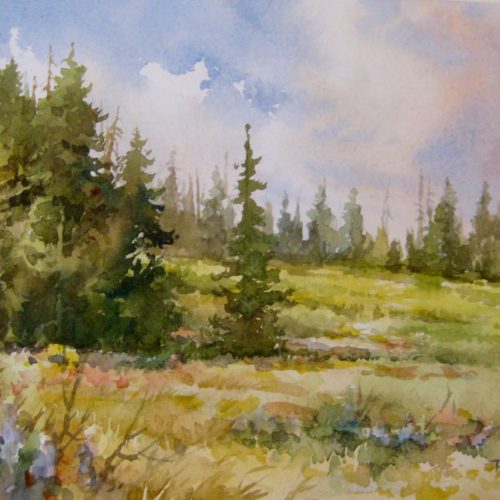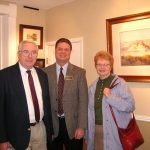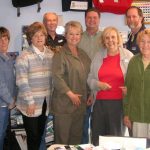
In late fall Zion Canyon is peaceful and quiet. The crowds are gone, the streams have dwindled to standing pools, and the leaves have begun to fall. In this scene the afternoon glow on the cliffs above is reflected in the shallow water of a shaded canyon. The worn rocks and strewn boulders are evidence that at certain times of the year this little stream is a raging torrent. But right now all is at peace.
 The painting begins with a pencil sketch on 140lb Arches watercolor paper. Following my usual pattern I begin to lay in broad washes of color, adding texture in the rocks by flipping clear water into the glazes with my brush. I also allow some of the pigment to mingle and blend on the paper.
The painting begins with a pencil sketch on 140lb Arches watercolor paper. Following my usual pattern I begin to lay in broad washes of color, adding texture in the rocks by flipping clear water into the glazes with my brush. I also allow some of the pigment to mingle and blend on the paper.
 Now I lay in the distant cliffs and some of the background area using the same tecniques as I used in the rocks. I am establishing value patterns, at the same time building up a sense of texture in the foliage and rocks. I will refine many of these areas with darker glazes as the painting progresses.
Now I lay in the distant cliffs and some of the background area using the same tecniques as I used in the rocks. I am establishing value patterns, at the same time building up a sense of texture in the foliage and rocks. I will refine many of these areas with darker glazes as the painting progresses.
The foreground grasses are painted using a technique called “back painting” or “negative painting.” In objects that appear light in a watercolor painting they must be preserved and established by painting the dark (or negative) areas around them.
Once the negative shapes are in place we can see the grasses emerge in a random fashion. Now I create a little more detail by overpainting additional shapes on the weeds.









